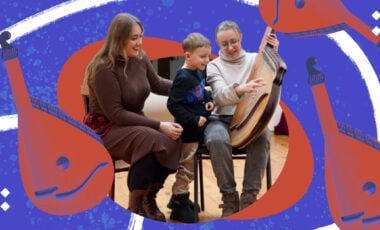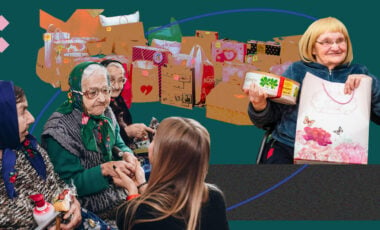One for all, all for one: how you can help women in need
"Woman for Woman" is a project that helps women get back on their feet when life situations seem hopeless. We explain how it works and how those who need it can get help.

Photo: Rubryka
The coronavirus pandemic has made a strike at the entire world's economy, but it has also affected people's psychological state. The World Trade Organization stated that the pandemic led to the world economy collapse in 2020 by more than a third. At the same time, long-term quarantine restrictions, job losses, and other pandemic factors have contributed to a significant increase in the number of people with depression and anxiety. One and a half years after the spread of the disease, the entire planet is still recovering.
Most people, including disadvantaged groups, like women, have faced financial and psychological difficulties and new challenges. The stories of those most in need have become more visible.
Marta Chumalo, deputy head of the Women's Perspectives Center, believes that the problem of women in difficulty is still relevant, that women are more vulnerable during crises.
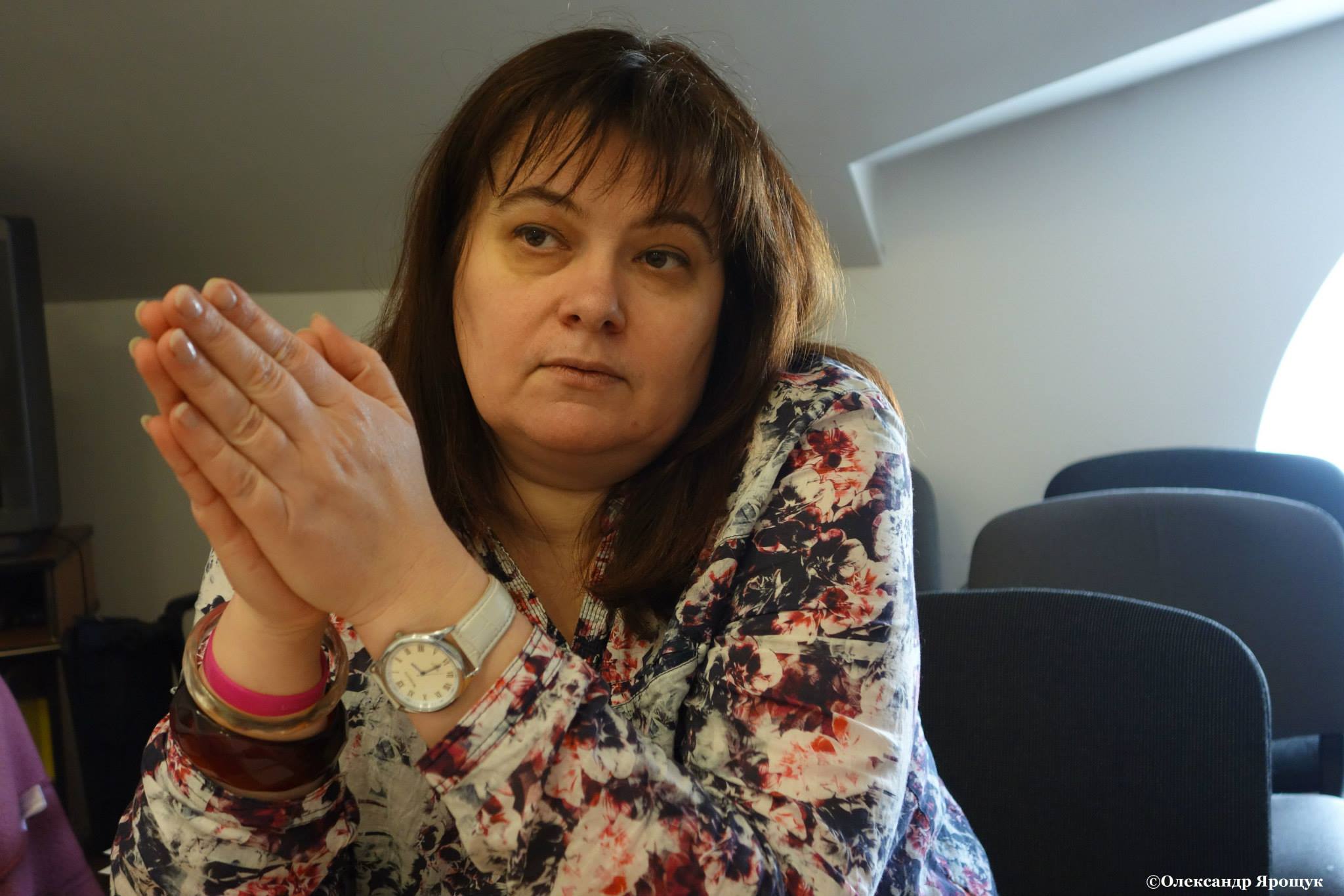
"The crisis has hit women very hard. Many of them lost their jobs and were actually left alone with the problems they had. Society supports men's economic fulfillment more. When an employer chooses who to fire, he's more likely to fire a woman than a man, because, stereotypically, it's believed that a man feeds a family, is a better worker, and a woman is more burdened with household duties and the reproductive field. A man has more freedom, can devote more time to work," the human rights activist explains.
Marta added that during the crisis, the number of employees in areas with more women was greatly reduced: tourism, markets, catering, light industry.
That's why the NGO Women's Perspectives Center, which works to address the problems of unemployed women, women suffering from domestic violence, human trafficking, discrimination, and adverse life circumstances, launched a project in December 2020, within which women in a challenging situation can get help from other women.
How it works
The essence of the "Woman for Woman" project is to publicly tell a specific story. The project offers simple support tools, like financial assistance, purchasing products, and medication, ordering services, and providing work. For example, during June, the initiative raised 40,000 hryvnias to support women who appeal to the organization with their problems.
Marta Chumalo also stressed that they don't directly raise money, but try to make people help directly: "We don't charge a penny for any operating costs or advertising. We cover everything from other sources, not at all from people's finances. It's important for us that this true charity be very transparent and sincere, that there be no abuse and no suspicion."
At the same time, there's a risk of abuse among people, asking for help. That's why every story is checked before the ads are published.
"If we have friendly initiatives or acquaintances in that city, we ask them to visit the woman or meet her, ask volunteers to get to know her better in person; if not, we consider the documents that confirm the words. We really don't want our benefactors to support fraudsters. As soon as we suspect something, we immediately hide and stop the ad until we check and make sure," Marta Chumalo explains.
The human rights activist said that none of them had been approached by fraudsters, but once there was a situation when there were doubts about the veracity of the woman's words. Then she was asked for documents, but she refused, saying something like: "It takes a long time, and the money is needed now." The woman was then told that the announcement wouldn't be published without confirmation.
There are also occasional ads that don't find support, but in such cases, the project has philanthropists who say they trust the project and ask to write to them in person and provide card numbers because they don't have time to monitor social networks.
"This project is really very much about trust, solidarity, and humanity. It has never been the case that a woman who asked for help from 'Woman for a Woman' didn't receive support. In one way or another, we try to cover the needs," Marta explains.
Some women who've received support on a specific request gain financial independence and ask to have their ads removed.
"For example, there was a woman who was helped by a philanthropist to buy a manicure device. She started working and told them to remove her ads because she already provides services and earns more or less fine," Marta says.
At the same time, some women in a very vulnerable position need regular support. Ads about them are updated regularly. Marta believes that women, who are constantly helped by philanthropists, don't abuse: "There's no such thing that they constantly want large sums of money. It's not about large sums, it's at the level of survival. Sometimes they even say that 'it's very inconvenient, someone may need the money more, but can you give at least 500 hryvnias?'"
"I didn't expect to be helped"
Maryna is 40 years old and lives in eastern Ukraine. For almost a year now, the woman has been bedridden in her apartment because she suffered serious fractures when she fell out of a third-floor window.
Before the tragedy, Maryna loved to grow flowers on the windows: "I never stopped loving to do it. It's bad that there's no garden," the woman said.
"I have a lot of displaced fractures. I was in intensive care for two days and a month in traumatology," says Maryna.
Now a woman has a first-degree disability, can't work, rarely leaves home because she can't do it without the help of other people.
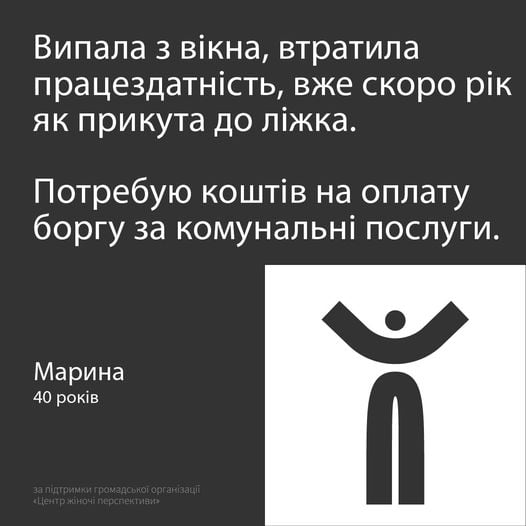
Maryna receives a pension of 1,800 hryvnias. This money is not enough for life. She needs to constantly buy medicine, pay for utilities, and buy food.
The woman no longer knew who to turn to with her problem. She had no relatives, and her son was studying. Then an acquaintance from Facebook, with whom they discussed flowers, advised contacting "Woman for Woman."
"You know, I didn't expect it. I applied and was immediately sent 500 hryvnias, although at that time I didn't have a single penny at all. I was very helped. I periodically apply: they sometimes send both money and parcels," says Maryna.
"I realized that I couldn't do it myself, it was the last straw"
Even when "Woman for Woman" didn't exist, 41-year-old Olia, who lives in Lviv, asked the Women's Perspectives Center for help. She had just given birth to a son and was in a maternity hospital. The woman is a full orphan from the age of 19. The husband has disappeared. He simply stopped communicating a few months before the birth of the child. There was nowhere to go with the kid.
She needed help with rent and some things for a start, but until recently, Olia was ashamed to ask for help. Marta posted this request on her Facebook page, and people responded. One woman gave a stroller, others gifted a bunch of diapers and clothes. It was Olia who inspired the launch of the "Woman for a Woman" project.
"I realized that I could not get round on my own. It was the last straw, a heartfelt cry. I accidentally went online and saw that you can apply for help in critical situations (to the Women's Perspectives Center – ed.). I called. Ms. Marta picked up the phone. I cried and told everything," says Olia.

Now the woman rents an apartment, sharing with other people, receives 850 hryvnias of child aid from the state. When her son was 2.5 months old, Olia went back to work at the factory as a car parts fitter. The son has a paid nanny, an acquaintance, a 70-year-old granny, who babysits him. For a long time, Olia hasn't asked "Woman for Woman" anything, but from time to time, when a difficult situation arises, she asks for help.
At the same time, Olia is positive; she says she'll try her best in the future. She recently sent a package of baby things to another woman, saying, "It's nice that not only are they helping me, but I've been able to do something good as well.
How to help
You can help a particular woman financially, or buy the necessary things/products/medication, or order paid services. You can read stories of women in need on Facebook, Instagram, and the initiative's website.
With your request for help, you need to contact the project through social media: leave a comment under a specific story or write a message on the project page.
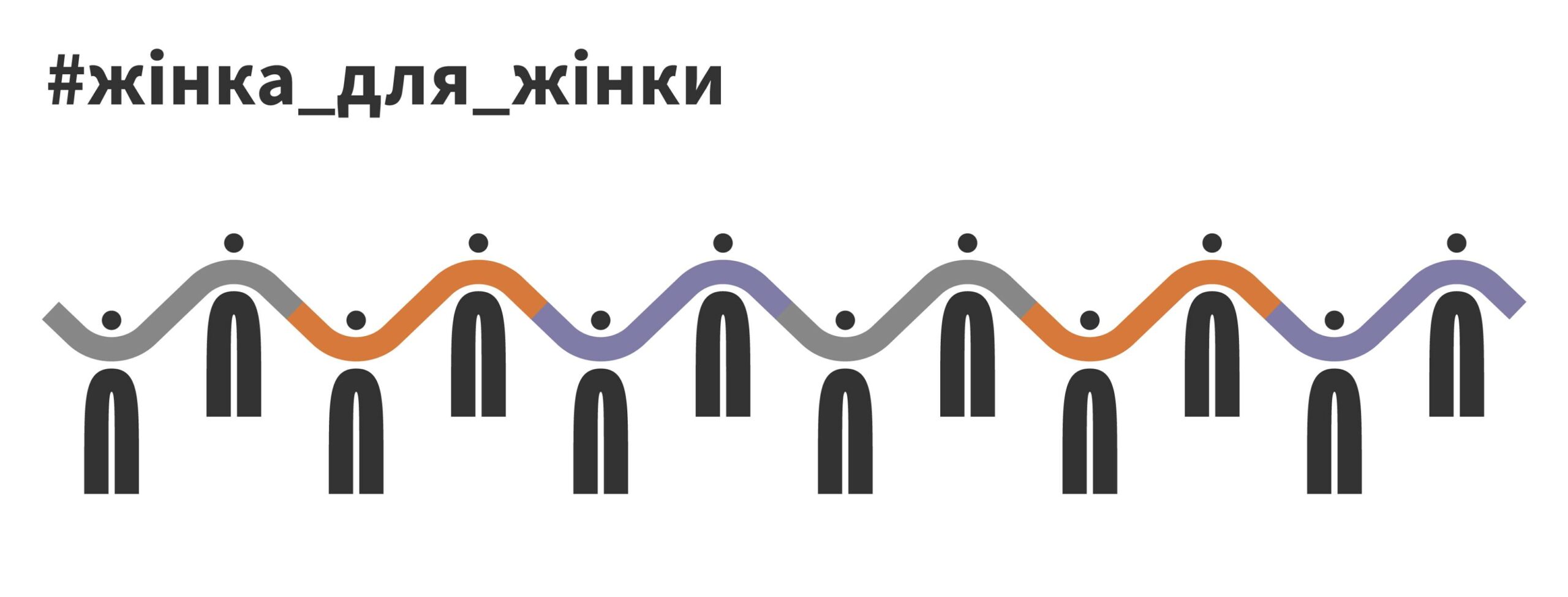
How to get help from "Woman for Woman"
If you're a woman and you think you're in a difficult situation, then to get help, you need to tell your story by answering a few questions in the questionnaire. You'll then be contacted by human rights activists.
Your story will appear on the website and will be available for viewing by philanthropists without disclosing your name, surname, and contact information. All the data you provide in the questionnaire is confidential, only the project coordinator will see it.
Also, if you can provide services for a fee, want to find a job or part-time job, indicate this in the questionnaire, and human rights activists from the "Woman for Woman" project will pass this information to philanthropists.

























